Business Law Report: Analysis of UK Law, Government, and Court System
VerifiedAdded on 2023/04/25
|11
|2335
|55
Report
AI Summary
This report provides a comprehensive overview of the UK legal system, encompassing its structure, sources of law, and the role of the government in lawmaking. It examines the composition of the legal system, including the separation of powers and the concept of jurisprudence, emphasizing the purpose of law in protecting society and ensuring compliance by organizations. The report delves into the parliamentary and delegated legislation, European law, and treaties as key sources of law. Furthermore, it analyzes the court structure in England and Wales, outlining the roles of various judges. The report also discusses the government's role in lawmaking, the application of statute and common law by the courts, and the procedures involved in creating and altering laws. Overall, the report highlights the importance of law in maintaining order, protecting rights, and facilitating business operations within the UK.
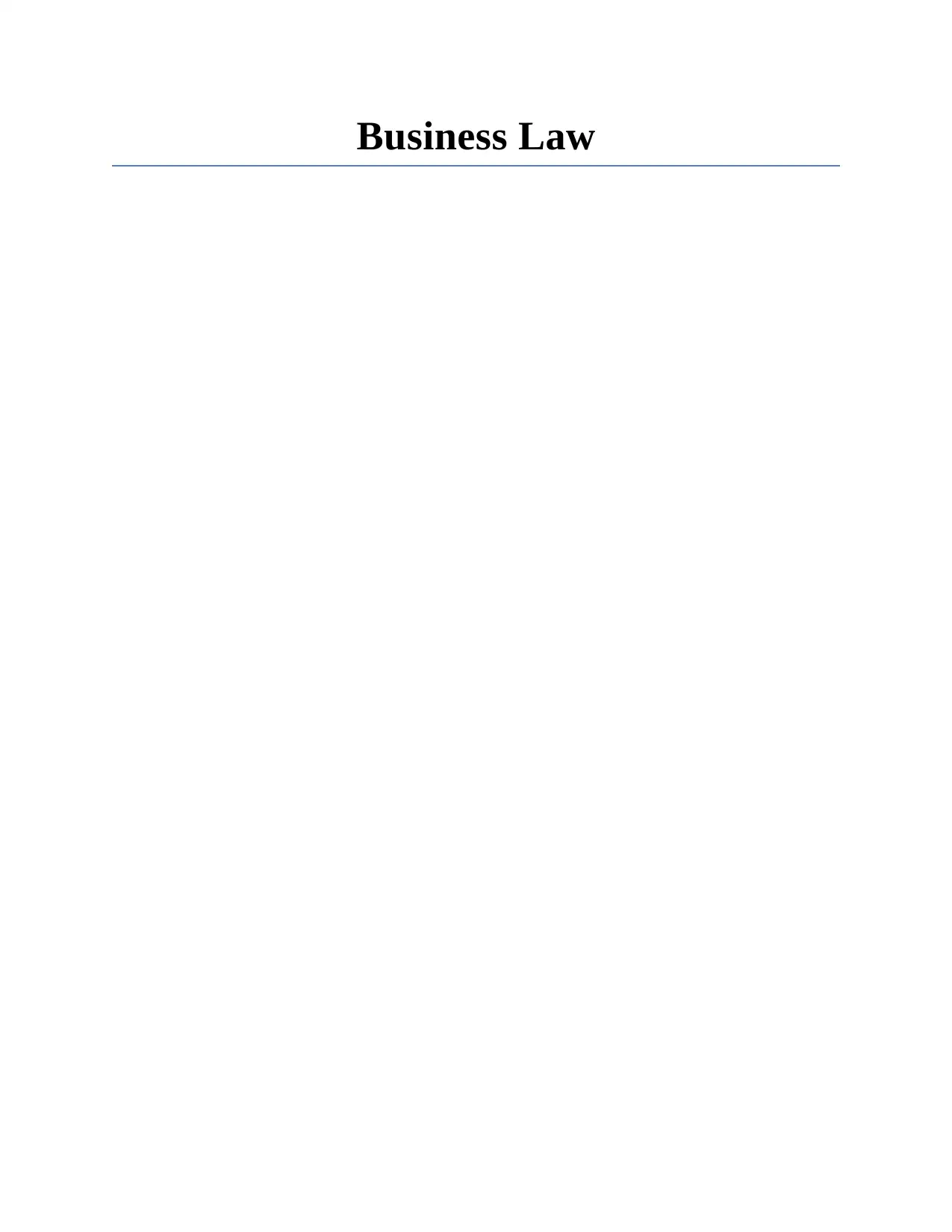
Business Law
Paraphrase This Document
Need a fresh take? Get an instant paraphrase of this document with our AI Paraphraser
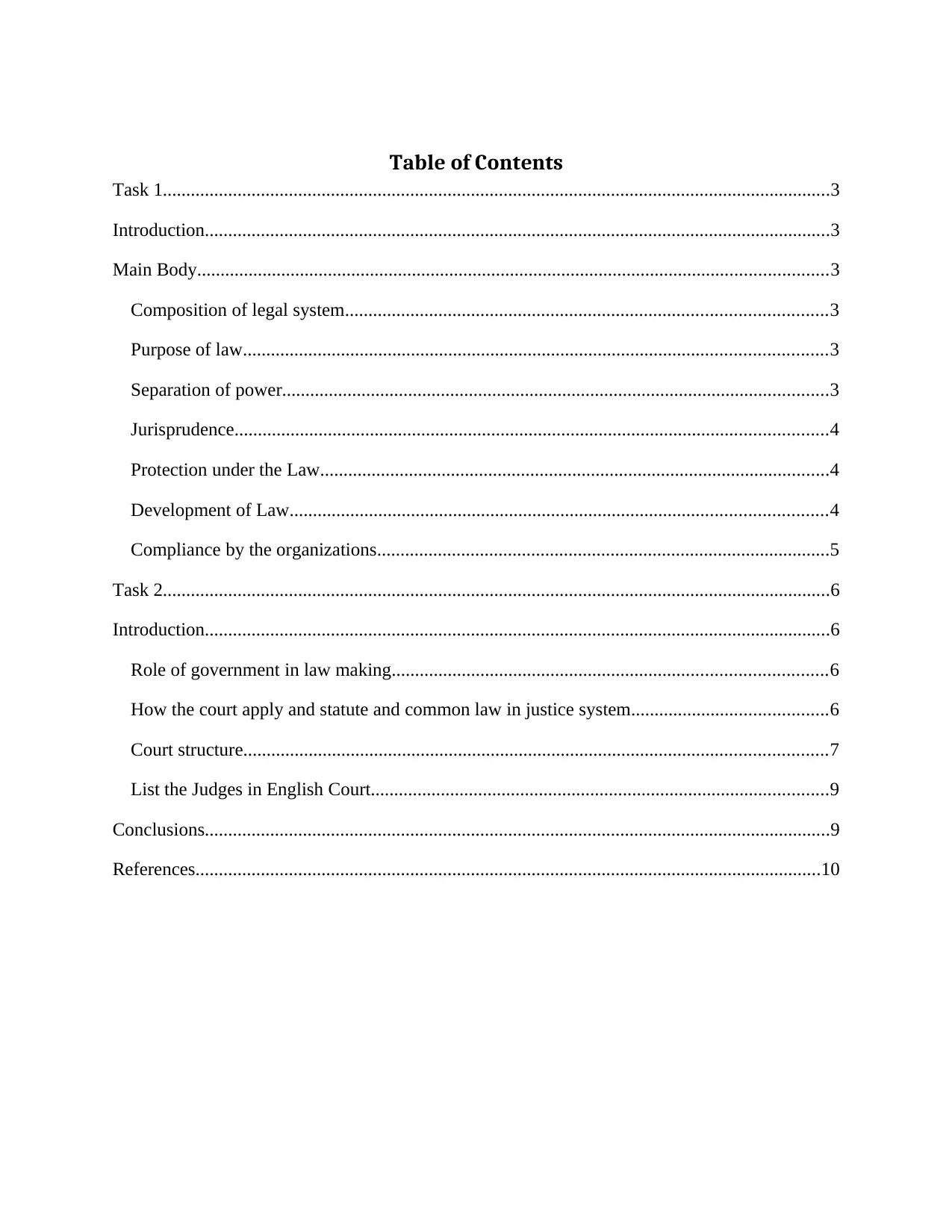
Table of Contents
Task 1...............................................................................................................................................3
Introduction......................................................................................................................................3
Main Body.......................................................................................................................................3
Composition of legal system.......................................................................................................3
Purpose of law.............................................................................................................................3
Separation of power.....................................................................................................................3
Jurisprudence...............................................................................................................................4
Protection under the Law.............................................................................................................4
Development of Law...................................................................................................................4
Compliance by the organizations.................................................................................................5
Task 2...............................................................................................................................................6
Introduction......................................................................................................................................6
Role of government in law making.............................................................................................6
How the court apply and statute and common law in justice system..........................................6
Court structure.............................................................................................................................7
List the Judges in English Court..................................................................................................9
Conclusions......................................................................................................................................9
References......................................................................................................................................10
Task 1...............................................................................................................................................3
Introduction......................................................................................................................................3
Main Body.......................................................................................................................................3
Composition of legal system.......................................................................................................3
Purpose of law.............................................................................................................................3
Separation of power.....................................................................................................................3
Jurisprudence...............................................................................................................................4
Protection under the Law.............................................................................................................4
Development of Law...................................................................................................................4
Compliance by the organizations.................................................................................................5
Task 2...............................................................................................................................................6
Introduction......................................................................................................................................6
Role of government in law making.............................................................................................6
How the court apply and statute and common law in justice system..........................................6
Court structure.............................................................................................................................7
List the Judges in English Court..................................................................................................9
Conclusions......................................................................................................................................9
References......................................................................................................................................10
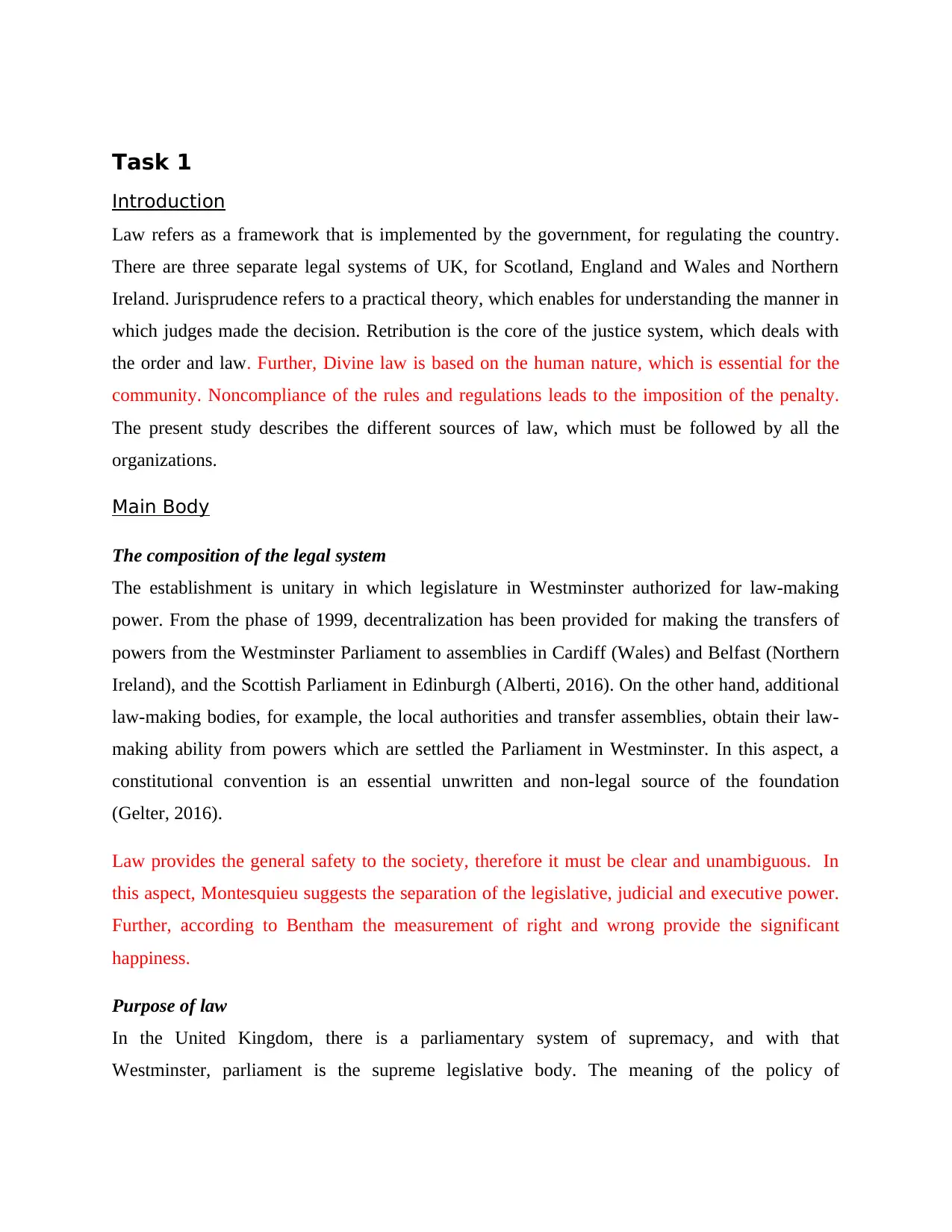
Task 1
Introduction
Law refers as a framework that is implemented by the government, for regulating the country.
There are three separate legal systems of UK, for Scotland, England and Wales and Northern
Ireland. Jurisprudence refers to a practical theory, which enables for understanding the manner in
which judges made the decision. Retribution is the core of the justice system, which deals with
the order and law. Further, Divine law is based on the human nature, which is essential for the
community. Noncompliance of the rules and regulations leads to the imposition of the penalty.
The present study describes the different sources of law, which must be followed by all the
organizations.
Main Body
The composition of the legal system
The establishment is unitary in which legislature in Westminster authorized for law-making
power. From the phase of 1999, decentralization has been provided for making the transfers of
powers from the Westminster Parliament to assemblies in Cardiff (Wales) and Belfast (Northern
Ireland), and the Scottish Parliament in Edinburgh (Alberti, 2016). On the other hand, additional
law-making bodies, for example, the local authorities and transfer assemblies, obtain their law-
making ability from powers which are settled the Parliament in Westminster. In this aspect, a
constitutional convention is an essential unwritten and non-legal source of the foundation
(Gelter, 2016).
Law provides the general safety to the society, therefore it must be clear and unambiguous. In
this aspect, Montesquieu suggests the separation of the legislative, judicial and executive power.
Further, according to Bentham the measurement of right and wrong provide the significant
happiness.
Purpose of law
In the United Kingdom, there is a parliamentary system of supremacy, and with that
Westminster, parliament is the supreme legislative body. The meaning of the policy of
Introduction
Law refers as a framework that is implemented by the government, for regulating the country.
There are three separate legal systems of UK, for Scotland, England and Wales and Northern
Ireland. Jurisprudence refers to a practical theory, which enables for understanding the manner in
which judges made the decision. Retribution is the core of the justice system, which deals with
the order and law. Further, Divine law is based on the human nature, which is essential for the
community. Noncompliance of the rules and regulations leads to the imposition of the penalty.
The present study describes the different sources of law, which must be followed by all the
organizations.
Main Body
The composition of the legal system
The establishment is unitary in which legislature in Westminster authorized for law-making
power. From the phase of 1999, decentralization has been provided for making the transfers of
powers from the Westminster Parliament to assemblies in Cardiff (Wales) and Belfast (Northern
Ireland), and the Scottish Parliament in Edinburgh (Alberti, 2016). On the other hand, additional
law-making bodies, for example, the local authorities and transfer assemblies, obtain their law-
making ability from powers which are settled the Parliament in Westminster. In this aspect, a
constitutional convention is an essential unwritten and non-legal source of the foundation
(Gelter, 2016).
Law provides the general safety to the society, therefore it must be clear and unambiguous. In
this aspect, Montesquieu suggests the separation of the legislative, judicial and executive power.
Further, according to Bentham the measurement of right and wrong provide the significant
happiness.
Purpose of law
In the United Kingdom, there is a parliamentary system of supremacy, and with that
Westminster, parliament is the supreme legislative body. The meaning of the policy of
⊘ This is a preview!⊘
Do you want full access?
Subscribe today to unlock all pages.

Trusted by 1+ million students worldwide
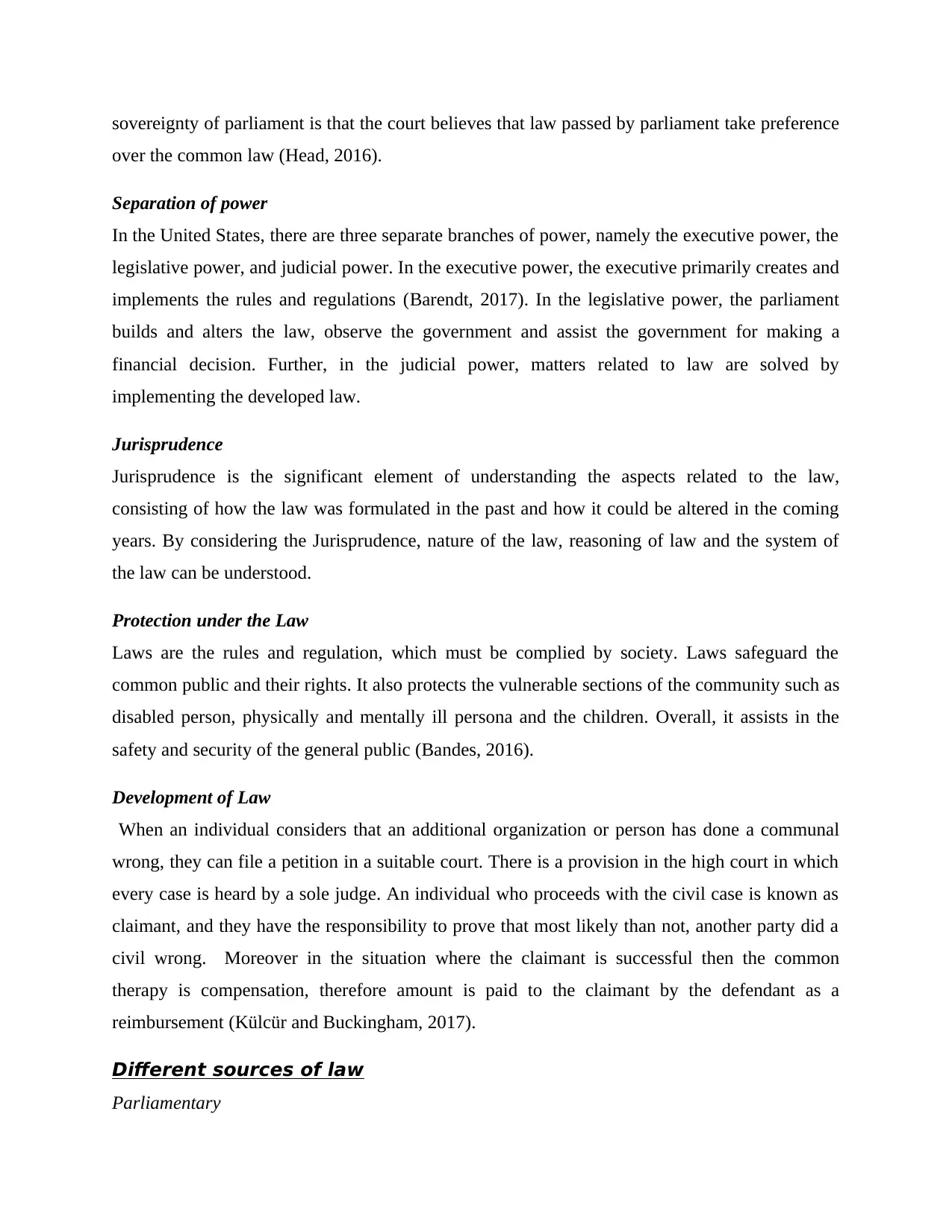
sovereignty of parliament is that the court believes that law passed by parliament take preference
over the common law (Head, 2016).
Separation of power
In the United States, there are three separate branches of power, namely the executive power, the
legislative power, and judicial power. In the executive power, the executive primarily creates and
implements the rules and regulations (Barendt, 2017). In the legislative power, the parliament
builds and alters the law, observe the government and assist the government for making a
financial decision. Further, in the judicial power, matters related to law are solved by
implementing the developed law.
Jurisprudence
Jurisprudence is the significant element of understanding the aspects related to the law,
consisting of how the law was formulated in the past and how it could be altered in the coming
years. By considering the Jurisprudence, nature of the law, reasoning of law and the system of
the law can be understood.
Protection under the Law
Laws are the rules and regulation, which must be complied by society. Laws safeguard the
common public and their rights. It also protects the vulnerable sections of the community such as
disabled person, physically and mentally ill persona and the children. Overall, it assists in the
safety and security of the general public (Bandes, 2016).
Development of Law
When an individual considers that an additional organization or person has done a communal
wrong, they can file a petition in a suitable court. There is a provision in the high court in which
every case is heard by a sole judge. An individual who proceeds with the civil case is known as
claimant, and they have the responsibility to prove that most likely than not, another party did a
civil wrong. Moreover in the situation where the claimant is successful then the common
therapy is compensation, therefore amount is paid to the claimant by the defendant as a
reimbursement (Külcür and Buckingham, 2017).
Different sources of law
Parliamentary
over the common law (Head, 2016).
Separation of power
In the United States, there are three separate branches of power, namely the executive power, the
legislative power, and judicial power. In the executive power, the executive primarily creates and
implements the rules and regulations (Barendt, 2017). In the legislative power, the parliament
builds and alters the law, observe the government and assist the government for making a
financial decision. Further, in the judicial power, matters related to law are solved by
implementing the developed law.
Jurisprudence
Jurisprudence is the significant element of understanding the aspects related to the law,
consisting of how the law was formulated in the past and how it could be altered in the coming
years. By considering the Jurisprudence, nature of the law, reasoning of law and the system of
the law can be understood.
Protection under the Law
Laws are the rules and regulation, which must be complied by society. Laws safeguard the
common public and their rights. It also protects the vulnerable sections of the community such as
disabled person, physically and mentally ill persona and the children. Overall, it assists in the
safety and security of the general public (Bandes, 2016).
Development of Law
When an individual considers that an additional organization or person has done a communal
wrong, they can file a petition in a suitable court. There is a provision in the high court in which
every case is heard by a sole judge. An individual who proceeds with the civil case is known as
claimant, and they have the responsibility to prove that most likely than not, another party did a
civil wrong. Moreover in the situation where the claimant is successful then the common
therapy is compensation, therefore amount is paid to the claimant by the defendant as a
reimbursement (Külcür and Buckingham, 2017).
Different sources of law
Parliamentary
Paraphrase This Document
Need a fresh take? Get an instant paraphrase of this document with our AI Paraphraser
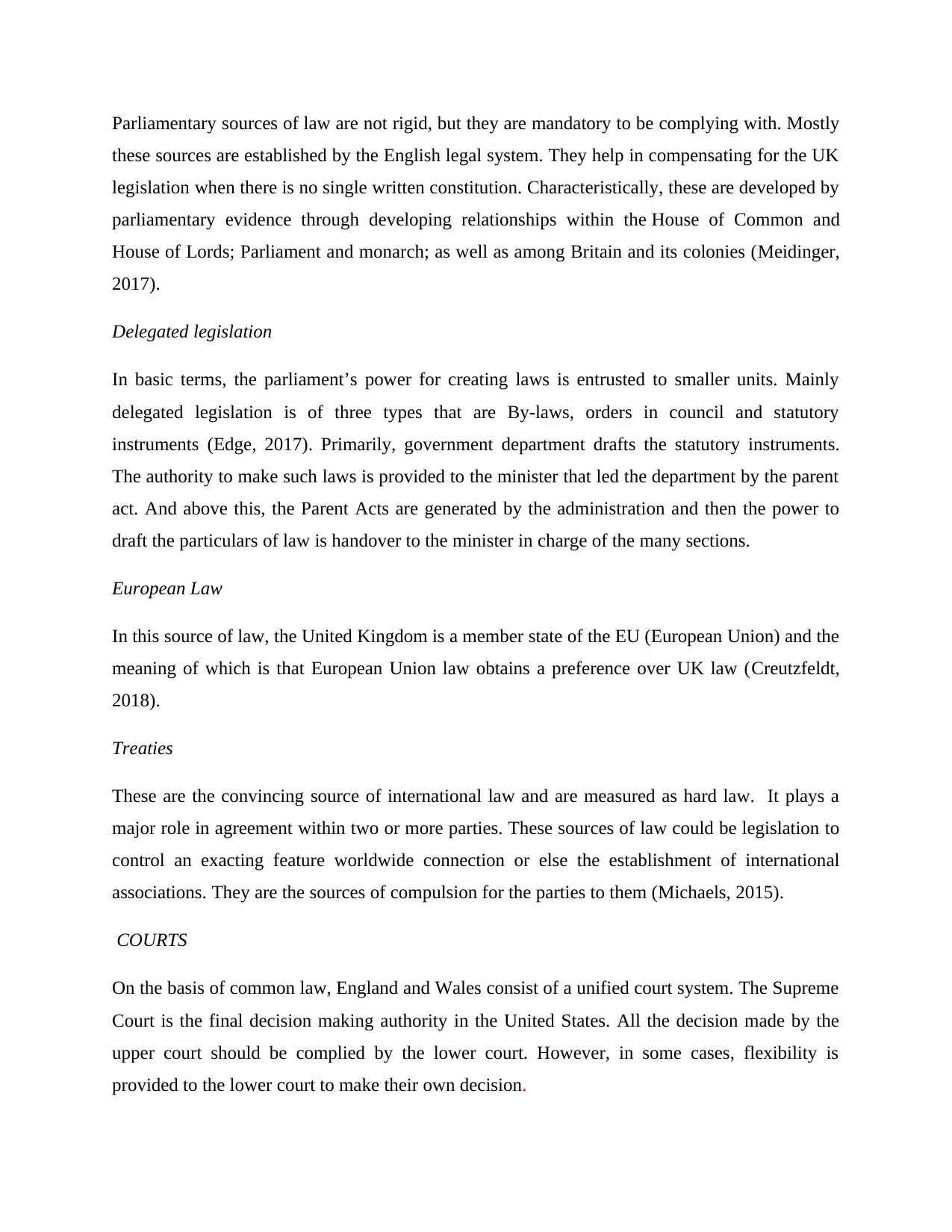
Parliamentary sources of law are not rigid, but they are mandatory to be complying with. Mostly
these sources are established by the English legal system. They help in compensating for the UK
legislation when there is no single written constitution. Characteristically, these are developed by
parliamentary evidence through developing relationships within the House of Common and
House of Lords; Parliament and monarch; as well as among Britain and its colonies (Meidinger,
2017).
Delegated legislation
In basic terms, the parliament’s power for creating laws is entrusted to smaller units. Mainly
delegated legislation is of three types that are By-laws, orders in council and statutory
instruments (Edge, 2017). Primarily, government department drafts the statutory instruments.
The authority to make such laws is provided to the minister that led the department by the parent
act. And above this, the Parent Acts are generated by the administration and then the power to
draft the particulars of law is handover to the minister in charge of the many sections.
European Law
In this source of law, the United Kingdom is a member state of the EU (European Union) and the
meaning of which is that European Union law obtains a preference over UK law (Creutzfeldt,
2018).
Treaties
These are the convincing source of international law and are measured as hard law. It plays a
major role in agreement within two or more parties. These sources of law could be legislation to
control an exacting feature worldwide connection or else the establishment of international
associations. They are the sources of compulsion for the parties to them (Michaels, 2015).
COURTS
On the basis of common law, England and Wales consist of a unified court system. The Supreme
Court is the final decision making authority in the United States. All the decision made by the
upper court should be complied by the lower court. However, in some cases, flexibility is
provided to the lower court to make their own decision.
these sources are established by the English legal system. They help in compensating for the UK
legislation when there is no single written constitution. Characteristically, these are developed by
parliamentary evidence through developing relationships within the House of Common and
House of Lords; Parliament and monarch; as well as among Britain and its colonies (Meidinger,
2017).
Delegated legislation
In basic terms, the parliament’s power for creating laws is entrusted to smaller units. Mainly
delegated legislation is of three types that are By-laws, orders in council and statutory
instruments (Edge, 2017). Primarily, government department drafts the statutory instruments.
The authority to make such laws is provided to the minister that led the department by the parent
act. And above this, the Parent Acts are generated by the administration and then the power to
draft the particulars of law is handover to the minister in charge of the many sections.
European Law
In this source of law, the United Kingdom is a member state of the EU (European Union) and the
meaning of which is that European Union law obtains a preference over UK law (Creutzfeldt,
2018).
Treaties
These are the convincing source of international law and are measured as hard law. It plays a
major role in agreement within two or more parties. These sources of law could be legislation to
control an exacting feature worldwide connection or else the establishment of international
associations. They are the sources of compulsion for the parties to them (Michaels, 2015).
COURTS
On the basis of common law, England and Wales consist of a unified court system. The Supreme
Court is the final decision making authority in the United States. All the decision made by the
upper court should be complied by the lower court. However, in some cases, flexibility is
provided to the lower court to make their own decision.
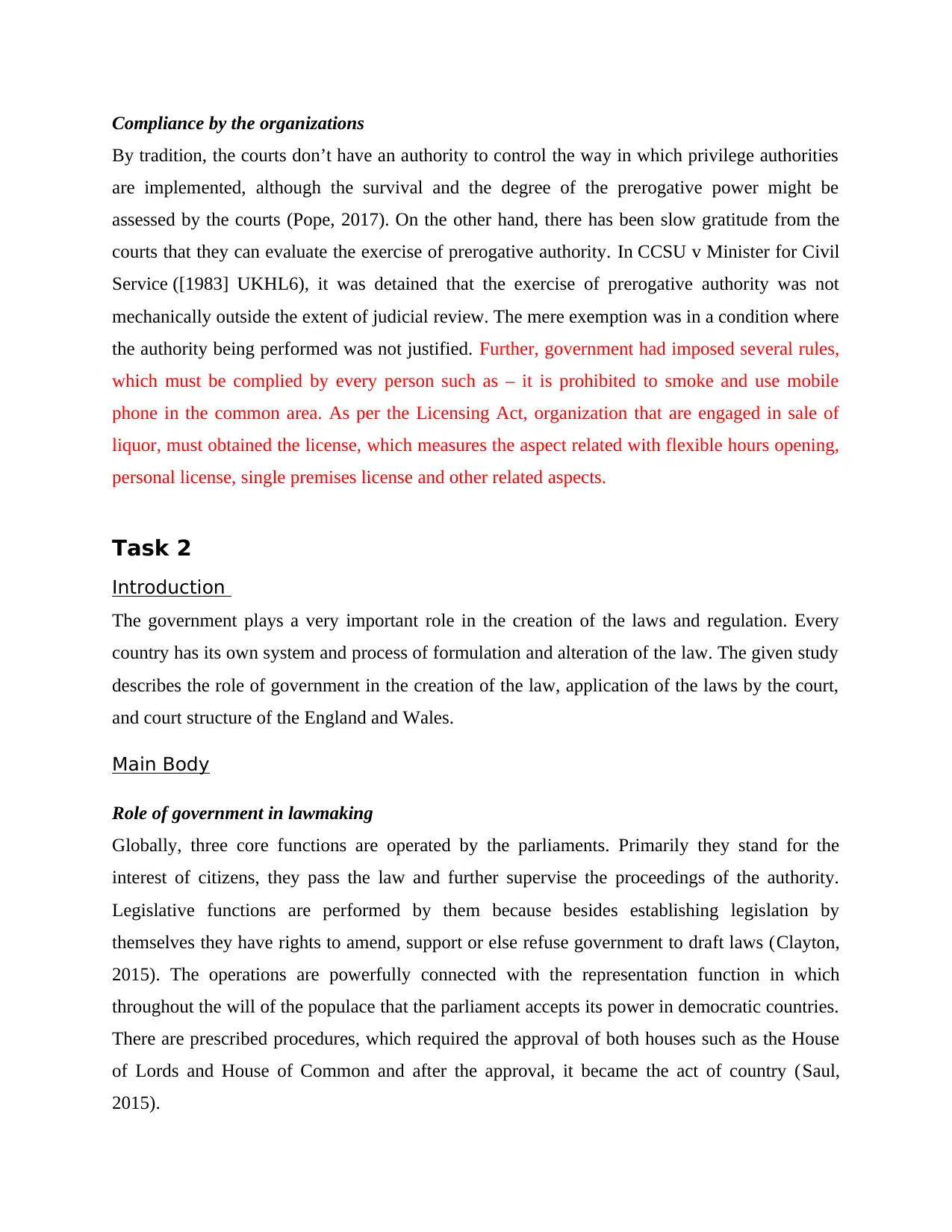
Compliance by the organizations
By tradition, the courts don’t have an authority to control the way in which privilege authorities
are implemented, although the survival and the degree of the prerogative power might be
assessed by the courts (Pope, 2017). On the other hand, there has been slow gratitude from the
courts that they can evaluate the exercise of prerogative authority. In CCSU v Minister for Civil
Service ([1983] UKHL6), it was detained that the exercise of prerogative authority was not
mechanically outside the extent of judicial review. The mere exemption was in a condition where
the authority being performed was not justified. Further, government had imposed several rules,
which must be complied by every person such as – it is prohibited to smoke and use mobile
phone in the common area. As per the Licensing Act, organization that are engaged in sale of
liquor, must obtained the license, which measures the aspect related with flexible hours opening,
personal license, single premises license and other related aspects.
Task 2
Introduction
The government plays a very important role in the creation of the laws and regulation. Every
country has its own system and process of formulation and alteration of the law. The given study
describes the role of government in the creation of the law, application of the laws by the court,
and court structure of the England and Wales.
Main Body
Role of government in lawmaking
Globally, three core functions are operated by the parliaments. Primarily they stand for the
interest of citizens, they pass the law and further supervise the proceedings of the authority.
Legislative functions are performed by them because besides establishing legislation by
themselves they have rights to amend, support or else refuse government to draft laws (Clayton,
2015). The operations are powerfully connected with the representation function in which
throughout the will of the populace that the parliament accepts its power in democratic countries.
There are prescribed procedures, which required the approval of both houses such as the House
of Lords and House of Common and after the approval, it became the act of country (Saul,
2015).
By tradition, the courts don’t have an authority to control the way in which privilege authorities
are implemented, although the survival and the degree of the prerogative power might be
assessed by the courts (Pope, 2017). On the other hand, there has been slow gratitude from the
courts that they can evaluate the exercise of prerogative authority. In CCSU v Minister for Civil
Service ([1983] UKHL6), it was detained that the exercise of prerogative authority was not
mechanically outside the extent of judicial review. The mere exemption was in a condition where
the authority being performed was not justified. Further, government had imposed several rules,
which must be complied by every person such as – it is prohibited to smoke and use mobile
phone in the common area. As per the Licensing Act, organization that are engaged in sale of
liquor, must obtained the license, which measures the aspect related with flexible hours opening,
personal license, single premises license and other related aspects.
Task 2
Introduction
The government plays a very important role in the creation of the laws and regulation. Every
country has its own system and process of formulation and alteration of the law. The given study
describes the role of government in the creation of the law, application of the laws by the court,
and court structure of the England and Wales.
Main Body
Role of government in lawmaking
Globally, three core functions are operated by the parliaments. Primarily they stand for the
interest of citizens, they pass the law and further supervise the proceedings of the authority.
Legislative functions are performed by them because besides establishing legislation by
themselves they have rights to amend, support or else refuse government to draft laws (Clayton,
2015). The operations are powerfully connected with the representation function in which
throughout the will of the populace that the parliament accepts its power in democratic countries.
There are prescribed procedures, which required the approval of both houses such as the House
of Lords and House of Common and after the approval, it became the act of country (Saul,
2015).
⊘ This is a preview!⊘
Do you want full access?
Subscribe today to unlock all pages.

Trusted by 1+ million students worldwide
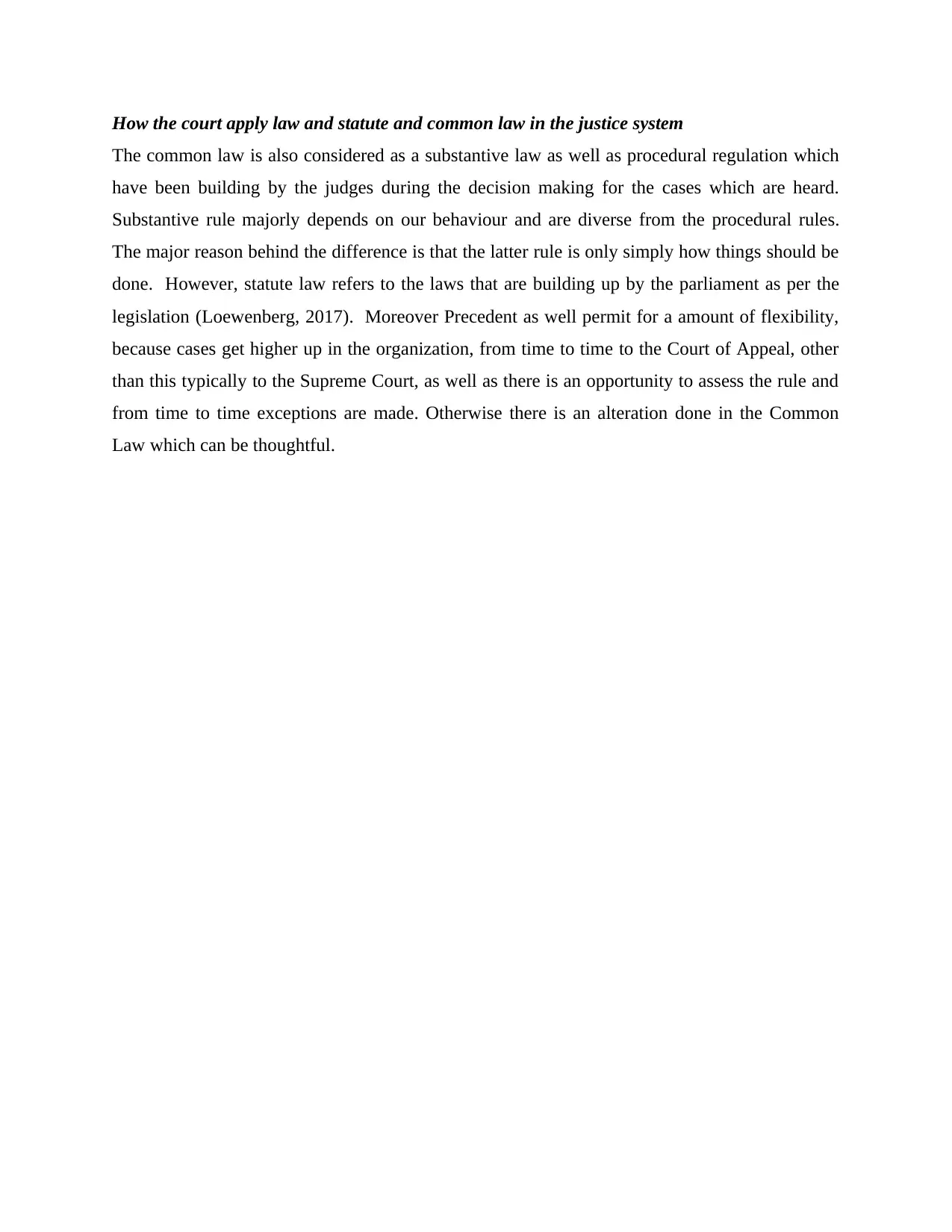
How the court apply law and statute and common law in the justice system
The common law is also considered as a substantive law as well as procedural regulation which
have been building by the judges during the decision making for the cases which are heard.
Substantive rule majorly depends on our behaviour and are diverse from the procedural rules.
The major reason behind the difference is that the latter rule is only simply how things should be
done. However, statute law refers to the laws that are building up by the parliament as per the
legislation (Loewenberg, 2017). Moreover Precedent as well permit for a amount of flexibility,
because cases get higher up in the organization, from time to time to the Court of Appeal, other
than this typically to the Supreme Court, as well as there is an opportunity to assess the rule and
from time to time exceptions are made. Otherwise there is an alteration done in the Common
Law which can be thoughtful.
The common law is also considered as a substantive law as well as procedural regulation which
have been building by the judges during the decision making for the cases which are heard.
Substantive rule majorly depends on our behaviour and are diverse from the procedural rules.
The major reason behind the difference is that the latter rule is only simply how things should be
done. However, statute law refers to the laws that are building up by the parliament as per the
legislation (Loewenberg, 2017). Moreover Precedent as well permit for a amount of flexibility,
because cases get higher up in the organization, from time to time to the Court of Appeal, other
than this typically to the Supreme Court, as well as there is an opportunity to assess the rule and
from time to time exceptions are made. Otherwise there is an alteration done in the Common
Law which can be thoughtful.
Paraphrase This Document
Need a fresh take? Get an instant paraphrase of this document with our AI Paraphraser
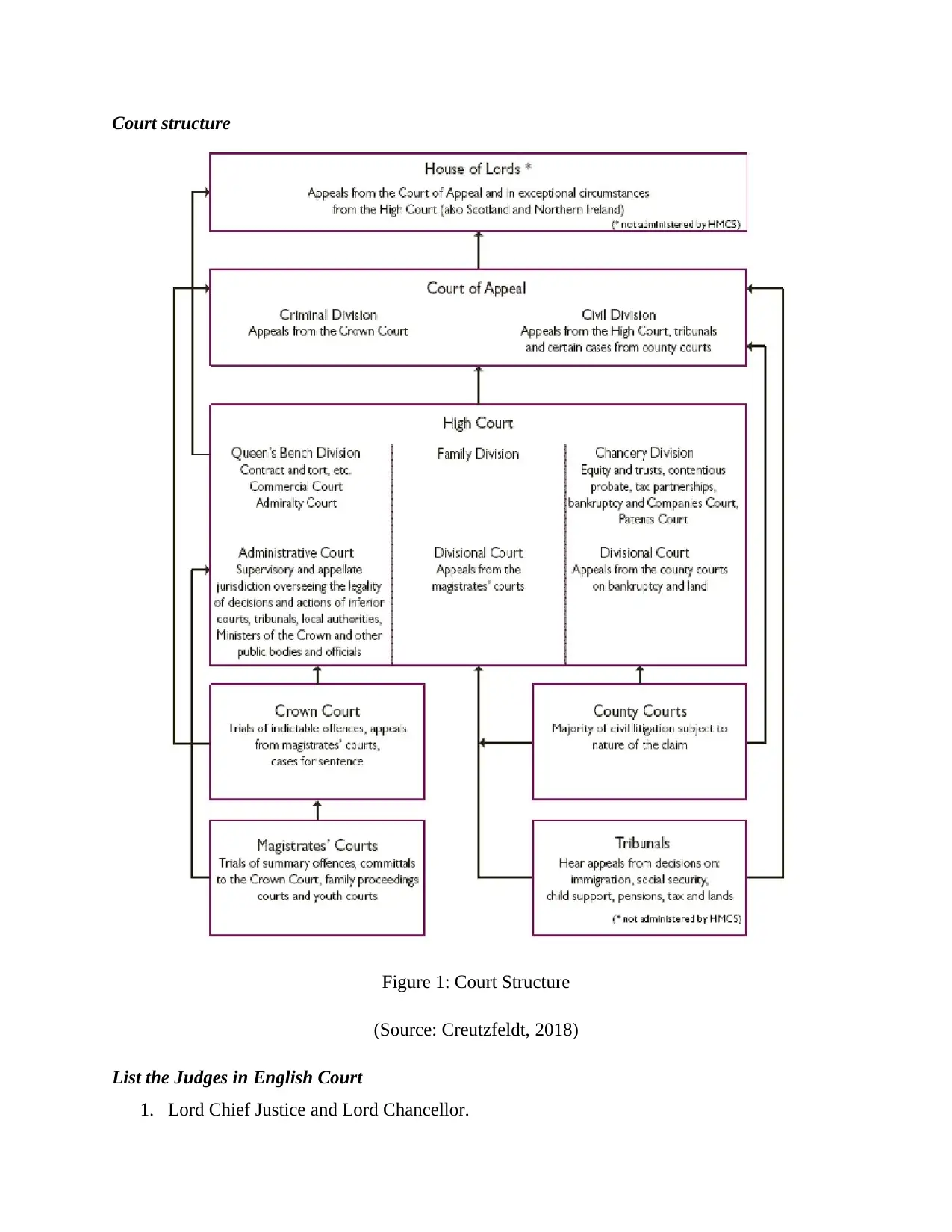
Court structure
Figure 1: Court Structure
(Source: Creutzfeldt, 2018)
List the Judges in English Court
1. Lord Chief Justice and Lord Chancellor.
Figure 1: Court Structure
(Source: Creutzfeldt, 2018)
List the Judges in English Court
1. Lord Chief Justice and Lord Chancellor.
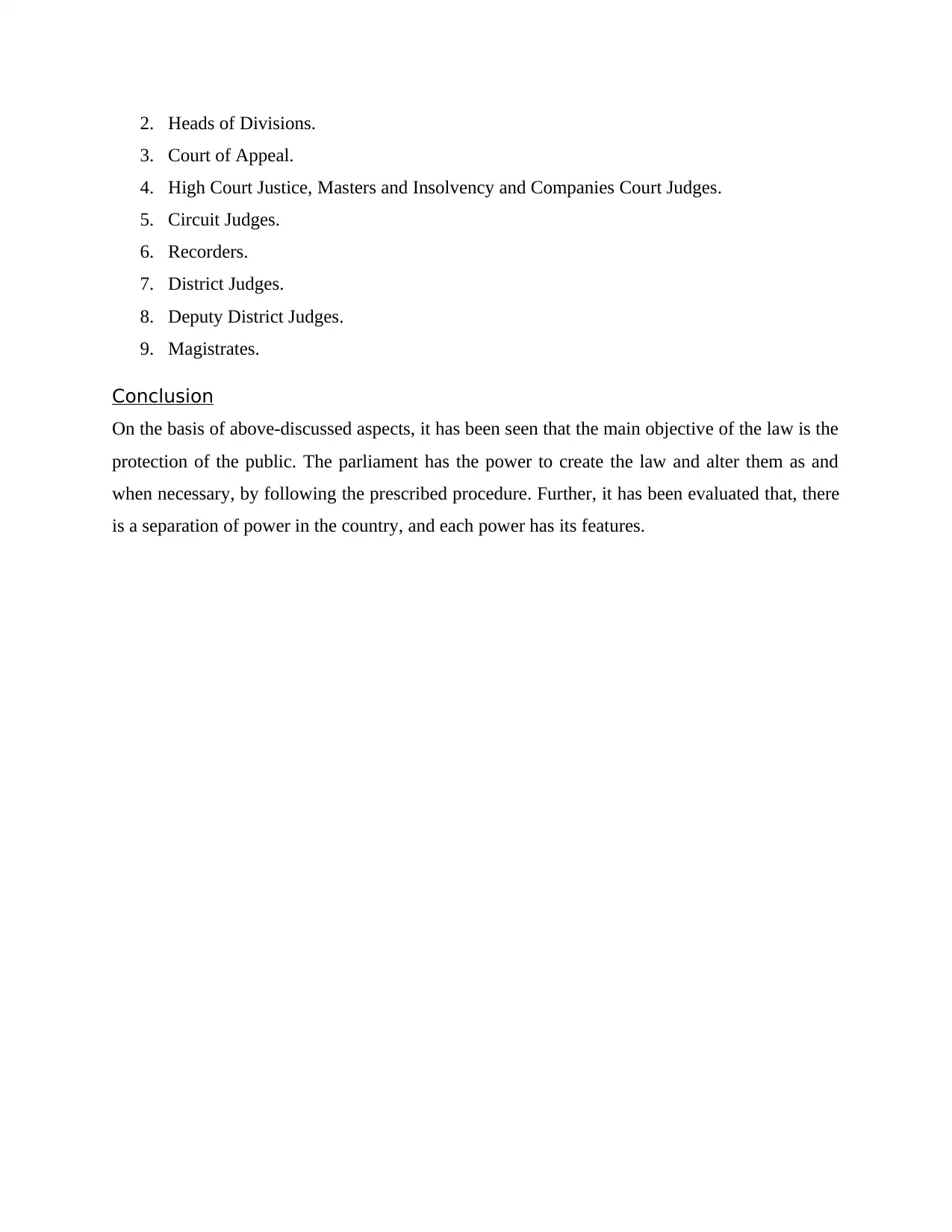
2. Heads of Divisions.
3. Court of Appeal.
4. High Court Justice, Masters and Insolvency and Companies Court Judges.
5. Circuit Judges.
6. Recorders.
7. District Judges.
8. Deputy District Judges.
9. Magistrates.
Conclusion
On the basis of above-discussed aspects, it has been seen that the main objective of the law is the
protection of the public. The parliament has the power to create the law and alter them as and
when necessary, by following the prescribed procedure. Further, it has been evaluated that, there
is a separation of power in the country, and each power has its features.
3. Court of Appeal.
4. High Court Justice, Masters and Insolvency and Companies Court Judges.
5. Circuit Judges.
6. Recorders.
7. District Judges.
8. Deputy District Judges.
9. Magistrates.
Conclusion
On the basis of above-discussed aspects, it has been seen that the main objective of the law is the
protection of the public. The parliament has the power to create the law and alter them as and
when necessary, by following the prescribed procedure. Further, it has been evaluated that, there
is a separation of power in the country, and each power has its features.
⊘ This is a preview!⊘
Do you want full access?
Subscribe today to unlock all pages.

Trusted by 1+ million students worldwide
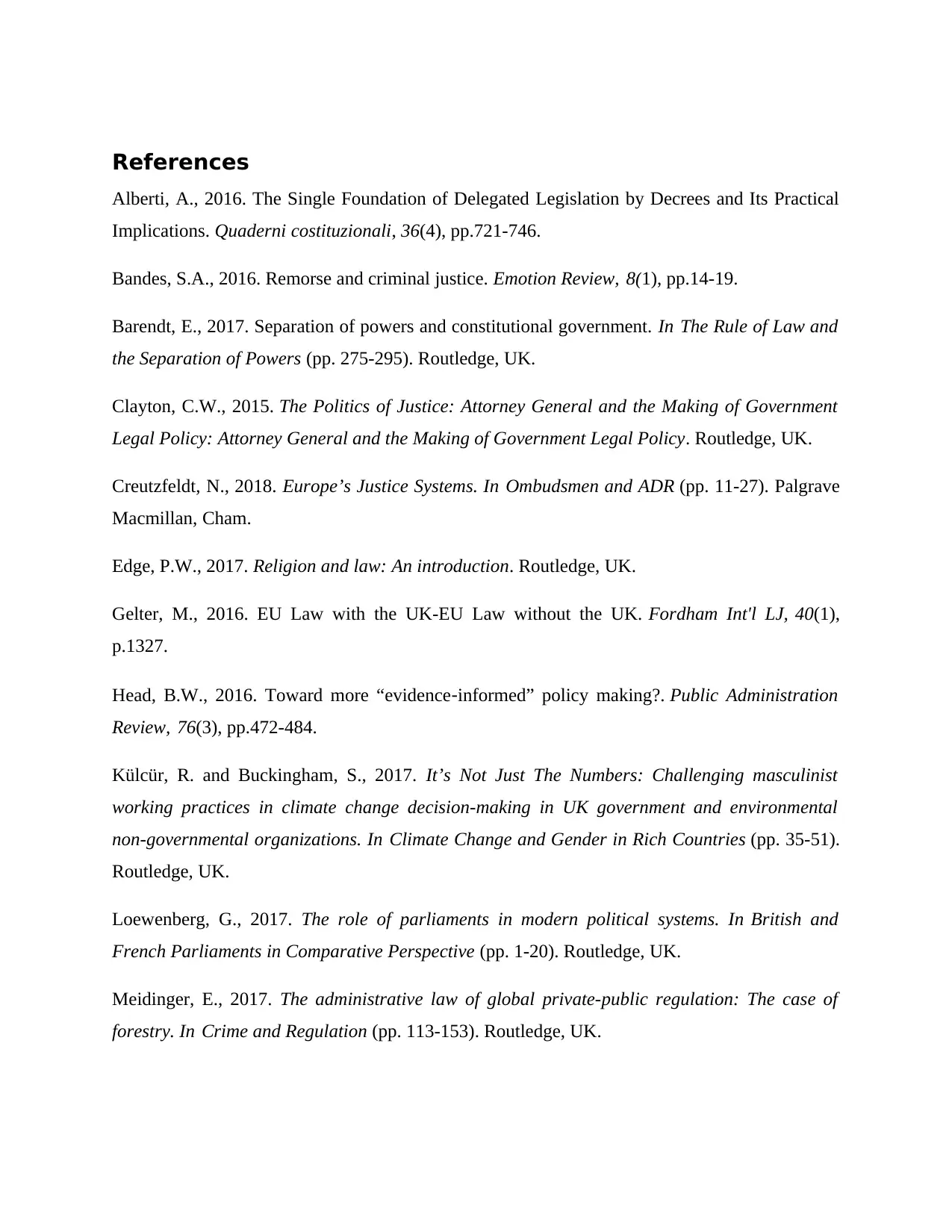
References
Alberti, A., 2016. The Single Foundation of Delegated Legislation by Decrees and Its Practical
Implications. Quaderni costituzionali, 36(4), pp.721-746.
Bandes, S.A., 2016. Remorse and criminal justice. Emotion Review, 8(1), pp.14-19.
Barendt, E., 2017. Separation of powers and constitutional government. In The Rule of Law and
the Separation of Powers (pp. 275-295). Routledge, UK.
Clayton, C.W., 2015. The Politics of Justice: Attorney General and the Making of Government
Legal Policy: Attorney General and the Making of Government Legal Policy. Routledge, UK.
Creutzfeldt, N., 2018. Europe’s Justice Systems. In Ombudsmen and ADR (pp. 11-27). Palgrave
Macmillan, Cham.
Edge, P.W., 2017. Religion and law: An introduction. Routledge, UK.
Gelter, M., 2016. EU Law with the UK-EU Law without the UK. Fordham Int'l LJ, 40(1),
p.1327.
Head, B.W., 2016. Toward more “evidence‐informed” policy making?. Public Administration
Review, 76(3), pp.472-484.
Külcür, R. and Buckingham, S., 2017. It’s Not Just The Numbers: Challenging masculinist
working practices in climate change decision-making in UK government and environmental
non-governmental organizations. In Climate Change and Gender in Rich Countries (pp. 35-51).
Routledge, UK.
Loewenberg, G., 2017. The role of parliaments in modern political systems. In British and
French Parliaments in Comparative Perspective (pp. 1-20). Routledge, UK.
Meidinger, E., 2017. The administrative law of global private-public regulation: The case of
forestry. In Crime and Regulation (pp. 113-153). Routledge, UK.
Alberti, A., 2016. The Single Foundation of Delegated Legislation by Decrees and Its Practical
Implications. Quaderni costituzionali, 36(4), pp.721-746.
Bandes, S.A., 2016. Remorse and criminal justice. Emotion Review, 8(1), pp.14-19.
Barendt, E., 2017. Separation of powers and constitutional government. In The Rule of Law and
the Separation of Powers (pp. 275-295). Routledge, UK.
Clayton, C.W., 2015. The Politics of Justice: Attorney General and the Making of Government
Legal Policy: Attorney General and the Making of Government Legal Policy. Routledge, UK.
Creutzfeldt, N., 2018. Europe’s Justice Systems. In Ombudsmen and ADR (pp. 11-27). Palgrave
Macmillan, Cham.
Edge, P.W., 2017. Religion and law: An introduction. Routledge, UK.
Gelter, M., 2016. EU Law with the UK-EU Law without the UK. Fordham Int'l LJ, 40(1),
p.1327.
Head, B.W., 2016. Toward more “evidence‐informed” policy making?. Public Administration
Review, 76(3), pp.472-484.
Külcür, R. and Buckingham, S., 2017. It’s Not Just The Numbers: Challenging masculinist
working practices in climate change decision-making in UK government and environmental
non-governmental organizations. In Climate Change and Gender in Rich Countries (pp. 35-51).
Routledge, UK.
Loewenberg, G., 2017. The role of parliaments in modern political systems. In British and
French Parliaments in Comparative Perspective (pp. 1-20). Routledge, UK.
Meidinger, E., 2017. The administrative law of global private-public regulation: The case of
forestry. In Crime and Regulation (pp. 113-153). Routledge, UK.
Paraphrase This Document
Need a fresh take? Get an instant paraphrase of this document with our AI Paraphraser
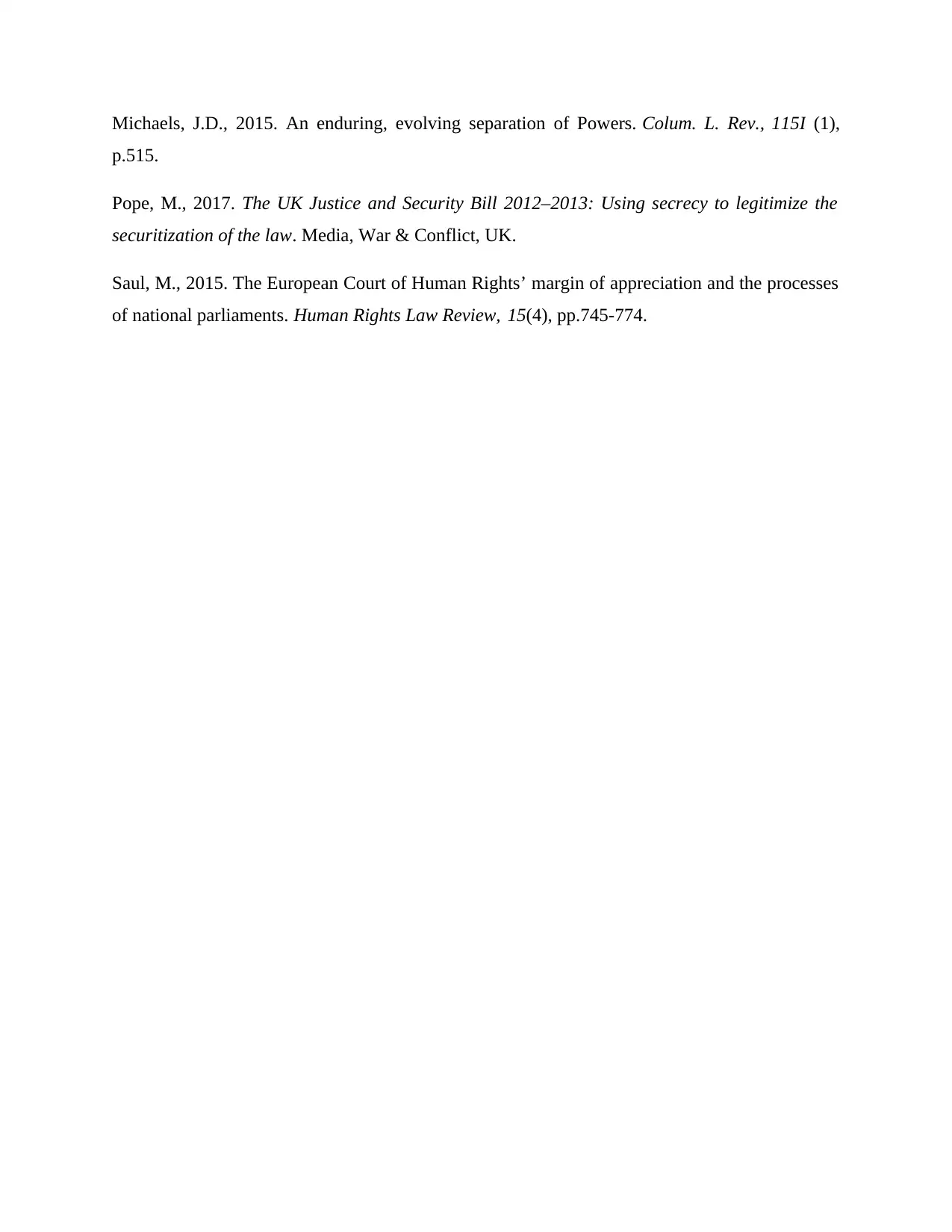
Michaels, J.D., 2015. An enduring, evolving separation of Powers. Colum. L. Rev., 115I (1),
p.515.
Pope, M., 2017. The UK Justice and Security Bill 2012–2013: Using secrecy to legitimize the
securitization of the law. Media, War & Conflict, UK.
Saul, M., 2015. The European Court of Human Rights’ margin of appreciation and the processes
of national parliaments. Human Rights Law Review, 15(4), pp.745-774.
p.515.
Pope, M., 2017. The UK Justice and Security Bill 2012–2013: Using secrecy to legitimize the
securitization of the law. Media, War & Conflict, UK.
Saul, M., 2015. The European Court of Human Rights’ margin of appreciation and the processes
of national parliaments. Human Rights Law Review, 15(4), pp.745-774.
1 out of 11
Related Documents
Your All-in-One AI-Powered Toolkit for Academic Success.
+13062052269
info@desklib.com
Available 24*7 on WhatsApp / Email
![[object Object]](/_next/static/media/star-bottom.7253800d.svg)
Unlock your academic potential
Copyright © 2020–2026 A2Z Services. All Rights Reserved. Developed and managed by ZUCOL.




